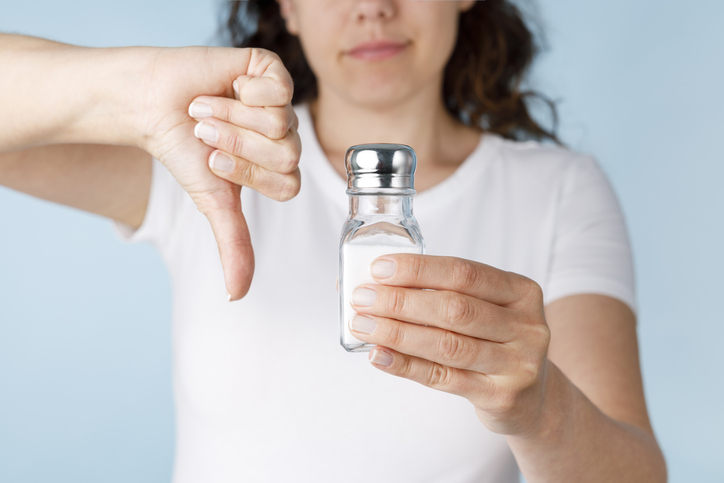Could Salt Be Slowing Your Weight Loss?
Salt is linked to fluid retention and bloating but did you know it could affect your weight too?

When we eat salty foods that can lead us to drink more water, and possibly increase fluid retention and blood pressure, but can salt also lead us to eat more, as well?
Does salt make you drink more?
Researchers have begun to explore salt’s previously unknown role in hunger and weight gain. Several recent studies shed light on why salt may encourage us to overeat.
“Until now, we have always focused on the effect of salt on blood pressure,” says Jens Titze, MD, associate professor of medicine and of molecular physiology and biophysics at Vanderbilt University in Nashville. “We have to expand our conceptions of salt and diet.”
Titze was the lead researcher on a new study challenging the notion that salty foods make us thirsty. Instead, he found that people who eat high amounts of salt actually drink less water than those who have smaller amounts of salt in their diet. They also become hungrier. Over the long term, that boost in appetite could lead us to overeat and gain weight.
Salt and space travel!
For the study, published last month, Titze and his colleagues gained access to a unique group of subjects: ten Russian cosmonauts who were preparing for the rigors of space travel to Mars. The space flight simulation, which lasted for months, provided a stable environment for the researchers to study how salt affected them.
Throughout the study, the cosmonauts’ diet did not vary except in one key way: The researchers changed the amount of salt in their food. The study subjects began on a diet that included 12 grams of salt per day. That’s about twice the amount recommended by U.S. dietary guidelines.
After several weeks, researchers reduced their salt to 9 grams per day. The cosmonauts ate 6 grams of salt daily during the final third of the study period.
What happened over the course of the study upended the researchers’ expectations:
The cosmonauts drank more water as their salt intake dropped. Not only that, but the cosmonauts complained of hunger while on the high-salt diet. “We said you can’t be hungry, you’re getting the same amount of food,” says Titze. “The only thing that’s changed is the amount of salt.”
In the space flight simulation study, the authors did not understand why the cosmonauts drank less and became hungrier on the higher-salt diet, so they turned to mice to find out. This study revealed that when mice ate a high-salt diet, their livers produced a substance called urea, which helps keep the body’s water in balance. But producing urea requires lots of energy, says Titze.
In other words, it requires food, specifically protein. And that need could be what caused the astronauts’ hunger.
Salt and health
Sodium, the main ingredient in salt, is an essential part of our diet, and not just for flavour. It keeps our muscles and nerves working properly, and it helps our bodies maintain the proper balance of fluids.
But when sodium levels rise too high, blood pressure often goes up as well. Over time, high blood pressure can have serious, life-threatening consequences. It can lead to stroke, heart attack, kidney disease, and other health problems.
Adults should eat less than 6 grams of salt each day – that’s about one teaspoon. This includes the salt that’s contained within ready made foods like bread, as well as the salt you add during cooking and at the table.
Most of us, however, get far too much so always check the labels on food and condiments you buy.
Salt and obesity
Scientists have begun to investigate whether salt affects obesity. Here’s what they have found:
• In 2015, British and Chinese researchers reported that body fat increased for children and adults on high-salt diets. Eating an extra gram of salt each day increased the risk of obesity in children by 28% and in adults by 26%. The study authors said they don’t know why salt has this effect, but other studies suggest that it may change the way our bodies burn fat.
• An Australian study published 2016 linked high-salt diets with a 23% increased chance of obesity in schoolchildren. Those children may eat more because the salt makes the food taste good, the authors suggest. They also speculate that when they get thirsty after a salty meal, the children reach for easily available high-calorie soft drinks.
• Another Australian study from 2016, led by Russell Keast, PhD, tied salt to an 11% rise in the amount of food and calories that adults take in. The authors say salt improves the flavour, and that likely tempts people to eat more.
Keast, a professor of food science and head of the Centre for Advanced Sensory Science at Deakin University said in an email that he believes salt encourages people to eat more.
While these studies show a link between salt and body fat, increased eating, and obesity, they don’t show that salt makes any of those things happen. More research needs to be done to fully understand salt’s role.
Future research will tell more about Titze’s findings. In the meantime, Titze offers this advice:
“If you’re on a diet and trying to reduce the amount of food you eat but you always feel hungry, start thinking of salt. Perhaps reducing it may help you.”
How to reduce salt in your diet
Always taste food before eating, sounds obvious, but adding salt to your plate may just be a habit. Also, cut back on salt gradually so your taste buds can adapt. Suddenly stopping means your food will taste bland and unappetizing.
Be aware of the salt content of processed and prepared foods so check the label, you might be surprised by how high it is.
Obviously eating at home you have more control so use more seasonings such as garlic, fresh or dry herbs, and black pepper.
Ease off on items such as pre-made salad dressing, ketchup and soy sauce, which are again often very high in salt.
Helpful information
Oestrogen dominance is linked to fluid retention and weight gain and so it might be helpful to identify if that is an issue for you, and try a diet designed to combat it.
https://anna.blog.wellsprings-health.com/the-diet-to-help-beat-oestrogen-dominance/



















